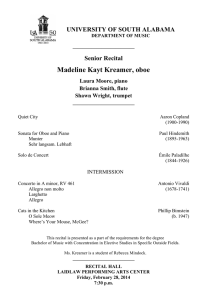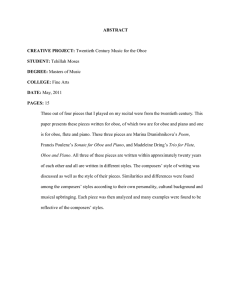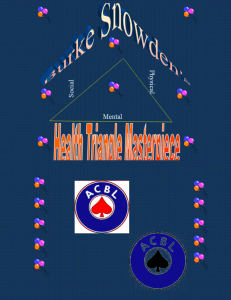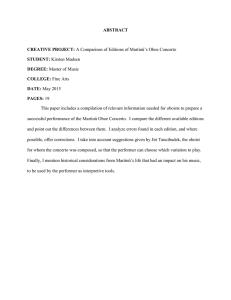.e, ,. Ob)f
advertisement
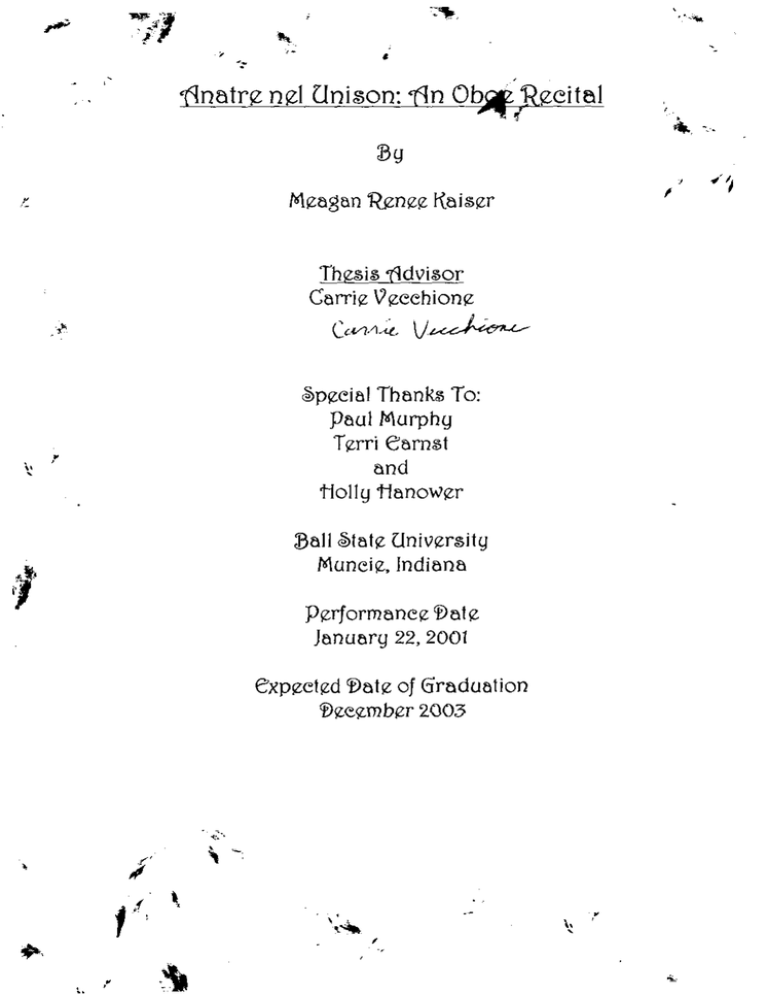
" '''ioI. • , 'dnatrll nlll Unison: 'dn Ob)f)illcital ~. :5y I y Thgsis tldvisor Carrill \?Ilcchionll CW7A .e, V~ \,, ,. @iPllcial Thanklll To: paul Murphy TIlrri ellfnlllt lInd tiolly tillnowllr :51111 @itlltll Univllrsity Muncill.lndianll Pllrformll nc ll'Datll )lInullry 22. 2001 eXPllctlld 'Vatll of <Jradulltion 'Dilcilmbilr 2003 , , \,, ,. -- ,;- • , Abstract .,, ~/ .. The oboe is an instrument that has been an integral part of ~estem music for the"~ -...-. last few centuries, and yet far too many Americans have never seen an oboe nor do they realize that they have heard the sound of this beautiful instrument before. The goal of this recital is to introduce a wide variety of individuals to th,"1 sounds of the oboe and its brother, the English hom, through a variety of friendly and inviting pieces. The music presented here spans three centuries and several European nations, thus showcasing many different colors of the oboe. It is the hope of the performers that the audience will come to find enjoyment in at least one of these pieces and forever remember the voice of the oboe. ," The title of this project Anatre nel Unison, means "Ducks in Unison" in Italian. A "duck" is a joking term sometimes used for an oboe/ oboist (in reference to the fact that the oboe is the "voice" for the duck in Peter and the Wolf and the fact that when one starts to learn to play ... one does sound rather like a duck quacking.) While meant to be whimsical, the title also carries real meaning for the performers. We are all still in the process of learning to be musicians, so like the ugly duckling we are still in transition to becoming swans. Luckily we have had each other to rely upon during this journey. "Ducks in Unison" refers to the strength that we gained from working together during the preparation for this . recital. It also refers to the sincere hope of all the performers that we can bring a love of this instrument to all those who hear it. Ducks in unison spreading our voices over the world ... quack! Acknowledgements lowe a great debt of thanks to Dr. Carrie Vecchione for all that she has done to help me with this recital and to teach me about her art over the years. Although I will not be pursuing music as a career as she has done, music and the oboe are things which will never leave my soul because of all I have learned from her. I wish to thank Paul Murphy and Terry Earnst for all their hard work and preparation on this recital. Paul, sharing a recital with you was quite and experience! Terry, thanks for all your help performing on "Water Music." (We couldn't have "Handeled" it without you!) I want to say a big THANK YOU to Holly Hanower as welI for her fabulous accompaniment'orr the piano. You are much appreciated. " ~ Finan/ thank you to family, friends, teachers, advisors, and all who attended for your Sl,fppo';t and interest in out little recital. Have a .wonderful evening! -. 1'" -\~- ~,~ / • • , Objectiws AIr " '. dL For my thesis project, I have chosen to perform in ajoint oboe recita1 with Paul Murphy. The recital is not a requirement afmy major, but rather something that I have,. '-" always wanted to attempt. I have heard from talented musicians who have come before me just how important it is to plan and perform one's own recital at least once during one's time in college. They have said that you learn so much about your own playing, .-.r your ability to work with others and organize a schedule, and they have also said that it helps you to realize where your true beliefs and philosophies toward music lie. In other words, it is a challenging journey of self-discovery. What could be more appropriate for the capstone project of one's degree? \,, • In addition to what I hope to gain from this project, it is my sincere desire to be . able to share the broad spectrum of colors of the oboe with my audience, in the hope that ~ they will come to recognize and appreciate this relatively unknown instrument, which is so much a part of our modem musical culture, Oboe has been with us as part of the , classical orchestra and as a solo instrument for centuries. Today, it can also be heard on the radio in pop songs, on commercials, and even in the background music for television and cinema. It is a haunting sound that tugs at our heartstrings, but which few people outside of the musical world can easily recognize. I hope that by perfonning this recital on campus and inviting friends both from the music school and from the university as a whole. that I can present the oboe and cor anglais to the people in such a way that they will not forget it ~wiJ1 perceive its role and value in the world around them. , • , ,,",, ! :._. ·"<io , • Senior Recital ~ Meagan Kaiser and Paul Murphy ~ Program NOles Shepherds of Provence is a delightful duet for oboe and english horn written by Eugene Bozza during the 1930's. Bozza was born in Nice, April 4,1905 and died in Valenciennes in 1991. He was best known for his woodwind chamber music during his lifetime. This particular piece was dedicated to Albert Andraud who played with the Cincinnati Symphony Orchestra and compiled a book known as the Vade Mecum of the Oboist, which translates to "The Everything of the Oboist." The book truly fulfills its title, which makes it fitting that this beautiful piece by Bozza should be included. The piece is programmatic in that thetitle, Shepherds of Provence, and the titles of individual movements are meant to prepare the listener 10 imagine the life of a shepherd in the rural provinces of Bozza's homeland. The first movement, Pastorale Provincale is an ongoing dialogue between the oboe and the cnglish hom. They begin as if singing a folk melody together, echo each other in sequence, and then return to sing together. There are numerous dynamic and tempo changes that add to the feeling of this being a conversation in song. Beneath the Stars is the third movement in this work.. Using many of the themes previously heard in the frrst movement, but in a much gentler way, this movement seeks to convey the nostalgic image of a gorgeous and tranquil night under the stars in the French countryside. r Gaetano Donizetti was an opera composer from the early 1800's who composed but one piece for the oboe. That piece is the Sonate for Oboe and Piano that you will her tonight. The influence of his skill with opera composing can clearly be heard throughout the work. There are declamatory sections of what sounds strikingly like recitative. followed by the more embellished and lyrical line of what could be tenned an instnunenlal aria. The first section is fairly serious and heavy, which is in sharp contrast to the second section. the allegro. which is quite jovial and has something of the feel of a peasant dance to it. It is important to mention also that to the perfonner's knowledge, no recordings of this piece have ever been made before today. It is her hope that this humble perfonnance will inspire others to do likewise in order to make this beautiful piece known by the public. The Six Metamorphoses after Ovid were written by Benjamin Britten, who is yet another twentieth century composer. Britten was born in England on November 22. 1913 and died December 4, 1976. This piece. as the title implies. was based on the book Six Metamorphoses, written by the Greek poet Ovid. The metamorphoses are instances in mythology when some sort of transfiguration has taken place. The first movement, Pan, is based on the story in ~ which Pan falls in love with a nymph named Syrinx. Pan pursues the nymph, but she does not return his affections and pleads with the water nymphs to tum her into a clump of marsh reeds. They have pity on her and do so. Pan, still intent on having her, pulls up the marsh reeds. fashions them to different lengths, and seals them together with wax; thus creating the pipes of Pan. In the music for the Britten piece, it says; PAN who played upon the reed pipe which was Syrinx, his beloved. Britten seems to be implying that in this movement Pan is beginning to try out the instrument that he has newly fashioned. The other movement that will be perfonned is the fourth movement of this work, entitled Bacchus. Bacchus is the Greek god of wine, parties, and gossip. The transformation here is not as mystical, it is simply the transformation that accompanies intoxication. The text at the beginning of this movement reads, BACCHUS at whose feast is heard the noise of gaggling women's tattling tongues and shouting out of boys. The movement begins with an Allegro pesante, implying a rather jaunty reel. possibly as of a man stumbling around drunkenly at a party. The next section is a march which could be interpreted as the boasting and rowdiness of young boys. Followed by this is the pesante feel again leading into a section that almost sounds like a series of trills which seems to signify the "gaggling women's tattling tongues." After this, the piece returns to the pesante figure to end the piece. The final piece on the program is the Suite from the Royal Water Music by Handel. The composer was born in 1685 and died in 1759. This particular piece was written for a river procession on the Thames that was taken by Handel's patrons, the royal family of England in 1717. There is a legend surrounding the creation of the Water Music that tells of how Handel had fallen out offavor with his patron. the elector of Hannover, a few years earlier because Handel left for Londodn with the understanding that he return in "a reasonable length of time." Two years later, Handel had still not returned. This particular eleclor of Hannover was soon after crowned the King of England. It was said that Handel avoided the court for a while after the coronation, and that this piece for the outing on the river was offered as appeasement. Regardless of whether the legend is true or not, it is a lovely work and this piece is without a doubt one ofHandel's most beloved of all time. , , , ....... , '- ", .... ,.- -~,..." - , ! , ;Bibliographg , Carpenter, Humphry Benjamin Britten: a biography London: Faber and Faber 1993 . .~ Cudworth, Charles a biography with a survey of books, editions, and recordings. Hamden, Conn. Linnet Books 1972 Deutch, Otto Erich Handel, a documentary biography. London, A, and C, Black 1955 Greatest Hits Pachabel (Compilation) Sony Classical Recording 1996 Mack, John John Mack, oboe. Sedro Wooley, WA: Chrystal Records 1990 Ovid, Allen Mandelbaum trans. The Metamorphoses of Ovid! a new verse translation . . New York: Harcourt Brace, 1993 Wheeler, Stephen Michael A discourse of wonders: audience and perfonnance in Ovid's Metamorphoses. Philadelphia: University ofPcnnsyivania Press, 1999 Zupnik, Marilyn Classic Oboe Etudes: Barret, Brad, Ferling. Six Metamorphoses After Ovid, Britten. DLM Records, 1998 \, \,, / • ... , f Handel~ \, , " • ':"..-. .,' ~
